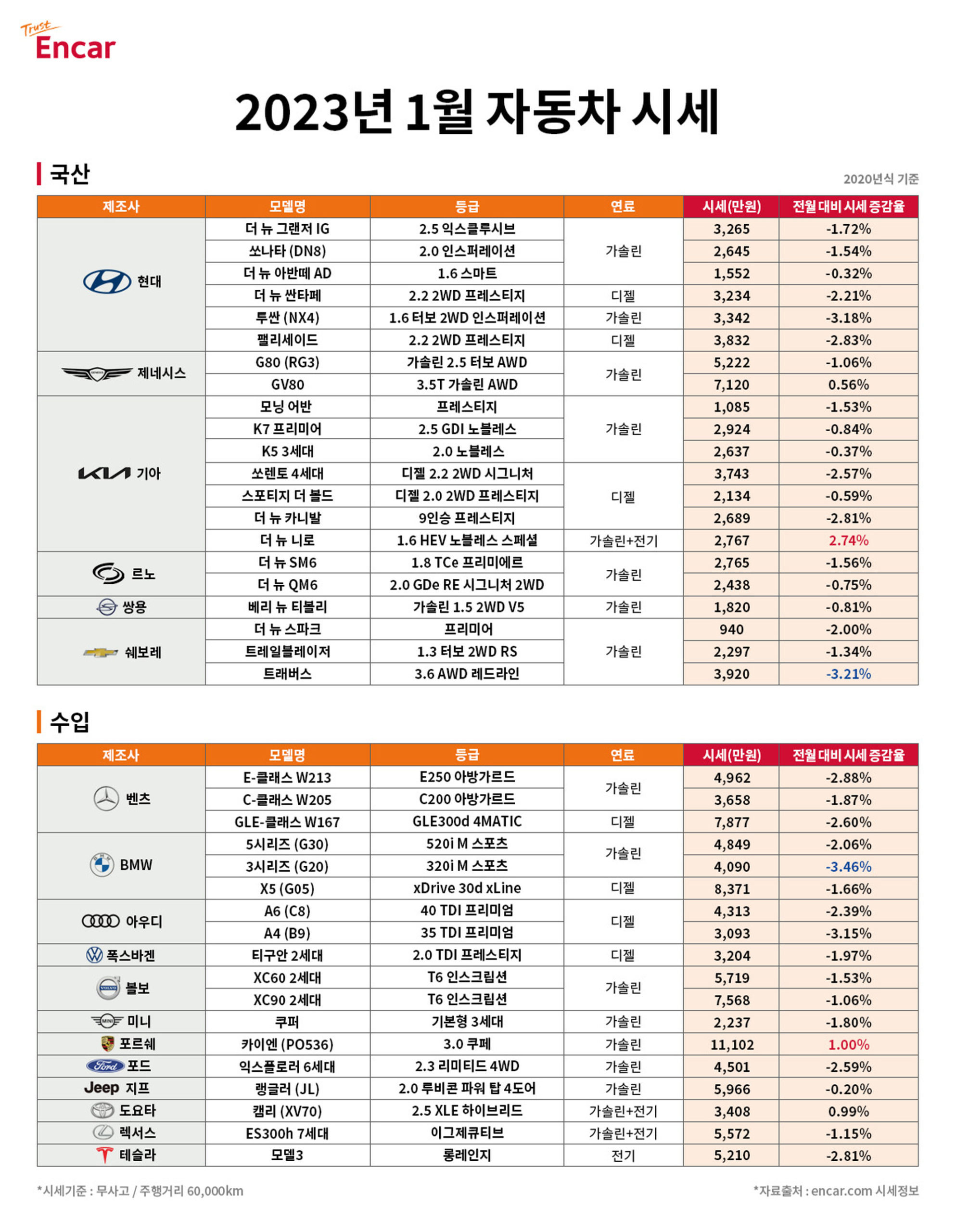
Encar.com has released the used car prices for January 2023. The prices disclosed are based on big data collected by Encar.com, analyzing the used car prices of popular models from domestic brands such as Hyundai, Kia, Renault Korea Motors, and Ssangyong Motors, as well as imported brands like Mercedes-Benz, BMW, and Audi from the year 2020. The analysis was conducted on vehicles with mileage up to 60,000 km and from accident-free cars.
January typically sees a trend where the prices rebound slightly as the demand for purchasing used cars, which was postponed during the end of the previous year, gradually increases with the new year.
For the New Year of the Year of the Cat, used car prices for major models of both domestic and imported vehicles decreased by an average of 1.52% compared to the previous month. This decline is analyzed to be a combination of factors causing used car prices, which had significantly increased due to recent economic circumstances, waiting for new car deliveries and supply shortages of raw materials, to return to previous levels.
Most domestic cars showed a downward trend in prices, with an average decrease of 1.33% compared to the previous month, except for a few models. Among domestic cars, SUVs experienced a greater decline in prices compared to sedans, making it reasonable to consider purchases before the long-distance travel period of the Lunar New Year holiday.
For Hyundai, the Tucson (NX4) 1.6 Turbo 2WD Inspiration dropped by 3.18%, the Palisade 2.2 2WD Prestige decreased by 2.83%, and the New Santa Fe 2.2 2WD Prestige fell by 2.21%. In contrast, the New Avante AD 1.6 Smart, known for its value for money in the 10 million won range, maintained stability with a slight drop of 0.32%. Additionally, the New Grandeur IG 2.5 Exclusive and Sonata (DN8) 2.0 Inspiration also showed a decline of just over 1%—lower than SUVs.
Kia saw its New Carnival 9-seater Prestige fall by 2.81%, and the fourth generation Sorento Diesel 2.2 2WD Signature decrease by 2.57%. However, the K5 3rd generation 2.0 Noble and K7 Premier 2.5 GDI Noble saw less price fluctuation at 0.37% and 0.84%, respectively, compared to SUV models.
The only model among domestic cars to experience a significant price increase was the hybrid model, the New Niro 1.6 HEV Noble Special, which increased by 2.74% from the previous month.
For imported vehicles, prices saw an average decrease of 1.73% compared to the previous month. Mid-size sedan models showed a greater decline than the average drop. The BMW 3 Series (G20) 320i M Sport saw a decrease of 3.46%, while the Audi A4 (B9) 35 TDI Premium dropped by 3.15%. Other models such as the E-Class W213 E250 Avantgarde, 5 Series (G30) 520i M Sport, A6 (C8) 40 TDI Premium, and 6th generation Explorer 2.3 Limited 4WD also exhibited declines in the range of 2%.
Despite the overall downward trend in prices among imported vehicles, the Porsche Cayenne (PO536) 3.0 Coupe was the only combustion engine model to see a 1% increase in price. Meanwhile, the hybrid model ES300h 7th generation Executive fell by 1.15%, while the Camry (XV70) 2.5 XLE Hybrid saw a slight increase of 0.99%. The electric vehicle model Tesla Model 3 Long Range experienced a price decline of 2.81% compared to the previous month.
An Encar.com official stated, “Unlike January last year, when price fluctuations were minimal due to delays in new car deliveries, this January has generally shown a downward trend. The overheating phenomenon of used car prices seen until last year seems to be calming down. However, there is still a possibility of prices rising again after the Lunar New Year holiday in January when household spending is high, so it might be worth considering purchasing a vehicle now.”
Lee Sang-jin daedusj@autodiary.kr

